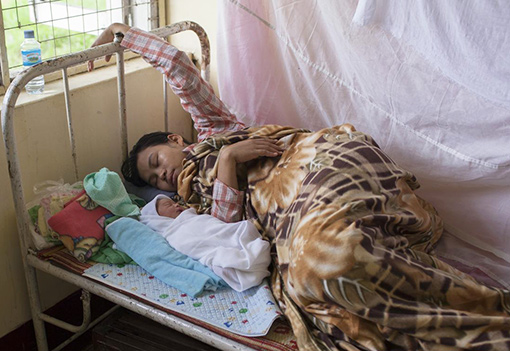
More than two-fifths of women surveyed in Myanmar were asked for a bribe from healthcare providers and more than one-fifth were slapped, mocked or otherwise abused during childbirth in health centres.
Of the 631 women interviewed in Myanmar, 99 also said they were asked to clean up their own blood, urine, faeces or amniotic fluid after birth, according to findings published Wednesday in The Lancet medical journal.
The new study led by the World Health Organization followed more than 2,000 women during labour and interviewed more than 2,600 women after childbirth in Myanmar, Nigeria, Ghana and Guinea.
Researchers visited three health centres from June 26 to September 5, 2017 in Myanmar, where they also found some women experienced caesarean sections and surgical cuts to the vagina, or episiotomies, without their consent.
“Women giving birth have the right to receive dignified and respectful care free from violence and mistreatment, yet the reality of millions worldwide who have finally spoken up is quite the opposite,” said UN rights expert Dubravka Šimonović.
“Women are suffering violations ranging from verbal abuse, sexist behaviour and profound humiliation, to physical violence such as unnecessary, compulsory and routine medical procedures carried out without full and informed consent.
“Some undergo invasive surgical treatments without anaesthesia, including unnecessary episiotomies, surgical removal of the placenta and suturing after birth. They may also suffer violations of privacy and physical abuse.”
In 52% of Myanmar cases, curtains, partitions or other privacy measures were not used. Nearly 21% experienced physical abuse, verbal abuse or discrimination, and 27% were asked for a bribe or informal payment.
“Action is urgently needed to enhance the provision of respectful maternity care worldwide,” concluded the study, which suggested improving the informed consent process and redesigning maternity wards to improve privacy.
“Women are often silenced because of fears of taboo, shame and the belief that childbirth is an event that requires suffering on their part,” said Šimonović.
“These are not sporadic events but part of a continuum of the gender-based violence that occur in the wider context of structural inequality, discrimination and patriarchy, and this widespread, systematic violence and mistreatment of women in childbirth must end.”
In 2016, a study showed that about 2,800 Myanmar women die in childbirth or during pregnancy mostly from treatable issues each year—the second highest mortality rate in Southeast Asia.

